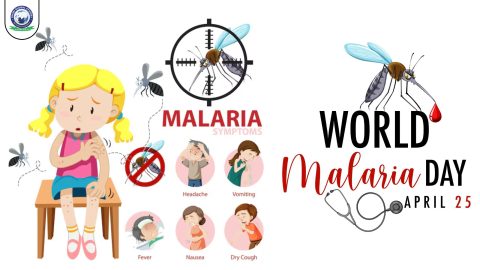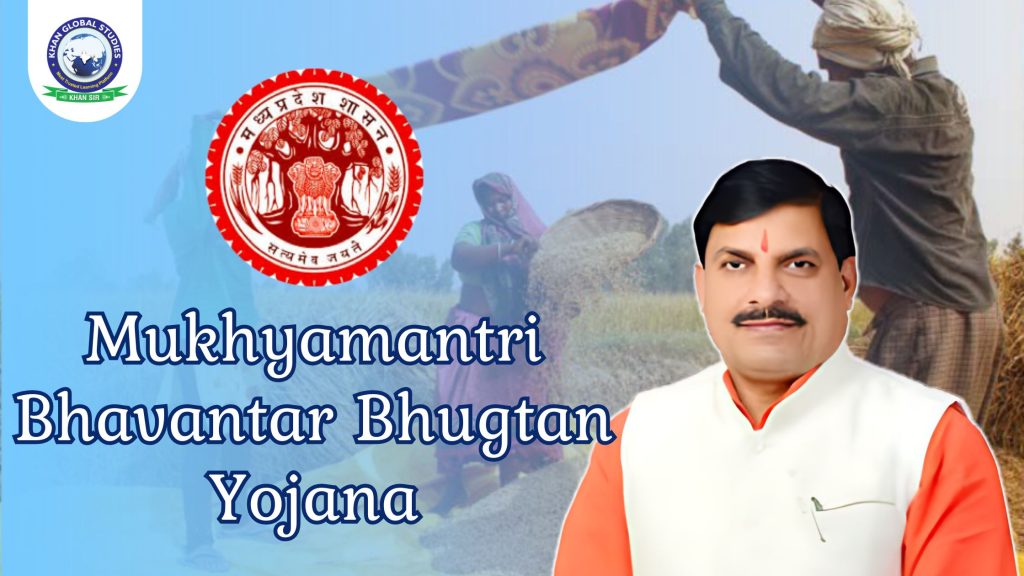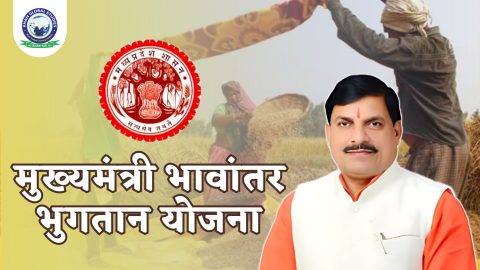To provide fair prices to the farmers of Madhya Pradesh for their agricultural produce, the state government will implement the Mukhyamantri Bhavantar Bhugtan Yojana for the Kharif season of the year 2017. Under this scheme, the difference between the minimum support price (MSP) and the model selling price at the Krishi Upaj Mandi Samiti will be deposited in the farmer’s bank account after following the procedure prescribed by the government.
Implementation of the MP Mukhyamantri Bhavantar Bhugtan Yojana
Multi-level Governance and Monitoring
To ensure effective and transparent implementation of the Mukhyamantri Bhavantar Payment Scheme, it involves multi-level governance and monitoring, which includes:
Policy Decisions and Review
- The Agriculture Cabinet, headed by the Hon’ble Chief Minister, will be responsible for taking all policy decisions related to the scheme.
- This body will also conduct regular reviews to ensure that the scheme is being implemented effectively and any problems faced during its implementation are being resolved.
District Level Monitoring
- The District Collector will have a key role in the local implementation of the scheme.
- They will ensure that all the necessary processes and registrations are carried out smoothly.
- They will also be responsible for setting up additional registration centres when required and verification of farmer registration and crop details.
Data Management and Transparency
- All data related to the scheme, including registration details, crop sales and payments, will be transparently maintained on the Mukhyamantri Bhavantar Payment Scheme portal.
- This data will be accessible for audit and review to ensure the scheme is implemented fairly and without any anomalies.
Support and Communication with Farmers
- The government will conduct awareness campaigns at the state and district levels to ensure that farmers are well aware of the scheme.
- Information will be disseminated through various channels, including local media, community meetings, and the Internet.
- Additionally, farmers will receive SMS notifications about payments and other important updates related to the scheme.
Concurrent Evaluation
- To assess the effectiveness of the scheme and make necessary improvements, the state government will select a reputed government or semi-government body that will conduct concurrent evaluations.
- These evaluations will provide information about how the scheme is performing and highlight areas that need attention.
Audit
- The financial transactions and data related to the scheme will be audited annually to ensure accountability and proper use of funds.
- This audit will be conducted by the designated agency that is responsible for managing the scheme’s data and payments.
Grievance Redressal Mechanism
- A strong grievance redressal mechanism will be put in place to address any complaints or issues of farmers.
- This mechanism will ensure that farmers can report problems and receive timely assistance.
Benefits of the Scheme
- Storage Subsidy: To prevent farmers from distress selling and encourage them to sell their produce at the appropriate time, farmers registered under the scheme can store their agricultural produce in licensed warehouses and avail storage subsidy of Rs 7 per quintal for up to four months.
- Direct Benefit Transfer (DBT): The amount payable under the scheme will be transferred to the registered bank account of the farmer through Direct Benefit Transfer (DBT). The responsible agency will inform the farmer about the payment through SMS.
- Parallel Evaluation and Publicity: A parallel evaluation of the scheme will be done by a reputed government or semi-government body. Publicity campaigns will be run to make farmers aware about the scheme at the state and district levels.
Eligibility for the Scheme
- Must be a permanent resident of Madhya Pradesh.
- Must be registered on the portal of the scheme.
- Must sell their produce in the designated mandi premises.
- Must be subject to production limit.
Calculation of the Amount Payable
- If the selling price is equal to or more than the MSP, no benefit will be provided.
- If the selling price is less than the MSP but more than the model selling price, the difference between the MSP and the selling price will be transferred to the farmer’s bank account.
- If the selling price is less than both the MSP and the model selling price, the difference between the MSP and the model selling price will be transferred to the farmer’s bank account.
- The benefit will be provided up to the quantity produced based on the average productivity of the district.
Impact of the scheme
The Chief Minister Bhavantar Payment Scheme has significantly increased the income of farmers of Madhya Pradesh. This scheme has helped farmers get a fair price for their produce and protected them from market fluctuations. This scheme has also boosted agricultural production in the state.
Governance
The implementation of the Mukhyamantri Bhavantar Bhugtan Yojana will involve multiple levels of governance and monitoring to ensure its effectiveness and transparency:
- Policy Decisions and Review: The Agriculture Cabinet, headed by the Hon’ble Chief Minister, will be responsible for taking all policy decisions related to the scheme. This body will also conduct regular reviews to ensure that the scheme is being implemented effectively and to address any issues that may arise during its implementation.
- District-Level Monitoring: The District Collectors will play a key role in the local implementation of the scheme. They will ensure that all the necessary processes and registrations are carried out smoothly. They will also be responsible for setting up additional registration centres when required and for verification of farmer registrations and crop details.
- Data Management and Transparency: All data related to the scheme, including registration details, crop sales and payments, will be maintained transparently on the Mukhyamantri Bhavantar Bhugtan Yojana portal. This data will be accessible for audit and review to ensure the scheme is implemented fairly and without any anomalies.
- Farmer Support and Communication: The government will conduct awareness campaigns at the state and district levels to ensure that farmers are well-informed about the scheme. Information will be disseminated through various channels including local media, community meetings, and the Internet. Additionally, farmers will receive SMS notifications about payments and other important updates related to the scheme.
- Concurrent Evaluation: To assess the effectiveness of the scheme and make necessary improvements, the state government will select a reputed government or semi-government institution to conduct concurrent evaluations. These evaluations will provide information on how the scheme is performing and highlight areas that need attention.
- Auditing: Financial transactions and data related to the scheme will be audited annually to ensure accountability and proper use of funds. This audit will be conducted by the designated agency responsible for managing the scheme’s data and payments.
- Grievance Redressal Mechanism: A robust grievance redressal mechanism will be established to address any complaints or issues faced by farmers. This mechanism will ensure that farmers can report problems and get timely assistance.
Conclusion
The Mukhyamantri Bhavantar Payment Yojana aims to provide financial assistance to farmers of Madhya Pradesh by compensating the difference between the Minimum Support Price (MSP) and the model selling price of their agricultural produce. By implementing this scheme, the state government aims to ensure that farmers get a fair price for their crops and are protected from distress sales. The scheme involves a comprehensive registration process, calculation of model selling prices, and direct benefit transfer to farmers’ bank accounts.
Additionally, it includes provisions for storage subsidies and ensures transparency through regular audits and concurrent evaluation. Successful implementation of this scheme will involve coordinated efforts at the state and district levels, including continuous monitoring and support for farmers.
Additional information
- For more information about the scheme, you can visit the Mukhyamantri Bhavantar Payment Scheme portal.
- For information related to the scheme, you can also call 1800-233-7373.




